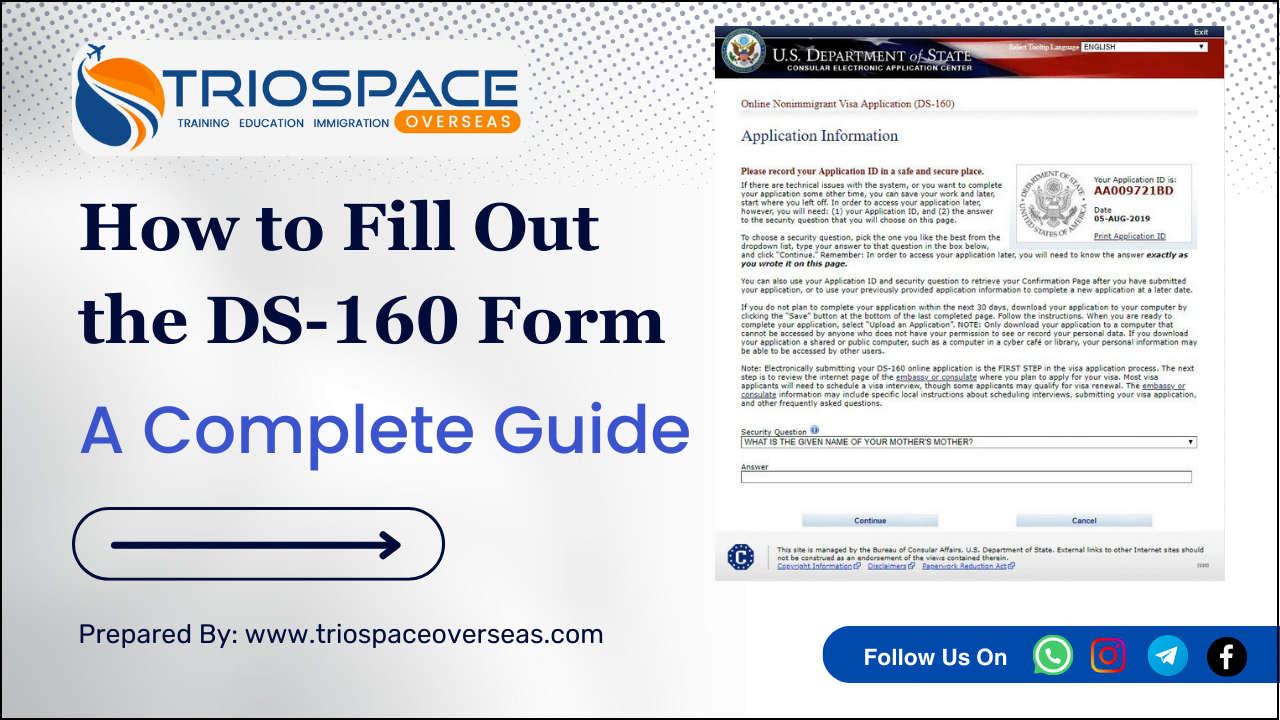
The Complete Guide to January Intake Universities in UK – 2024
As the new year comes closer, prospective students will have the chance to start over in their academic careers. Is the United Kingdom your top choice for a study abroad location? Do you find it important to know about future admissions sessions for UK institutions’ January intake? True? If so, you’ve come to the correct spot!
Our objective is to provide you, study in uk for international students with a comprehensive summary of the finest universities in the United Kingdom and also have low cost universities in the uk for international students that admit students in January, together with details on the best degree programs they provide.
Please Watch our video for a complete process of How to Study in UK | Complete UK Visa Process in Telugu | Triospace Overseas
Why should you study in the UK?
Studying in the UK offers a multitude of compelling reasons that make it a preferred destination for international students:
World-Class Education: The UK is home to some of the world’s top-ranking universities renowned for their academic excellence, innovative research, and high-quality teaching standards.
Diverse Course Options: Universities in the UK provide a vast array of courses, allowing students to choose from a diverse range of subjects and tailor their academic path to their interests and career goals.
Global Recognition: A degree (Masters in Uk) from a UK university is widely recognized and respected globally, enhancing your employability and opening doors to career opportunities internationally.
Post-Study Work Opportunities: The UK provides attractive post-study work options, allowing graduates to stay and work in the country after completing their studies, gaining valuable international work experience.
Cultural Diversity: You will be exposed to a diverse range of cultures while studying in the UK. You’ll have the chance to interact with people from various backgrounds, fostering a global perspective and enhancing your cultural awareness.
January Intake Universities in UK
Many esteemed universities in the United Kingdom offer an alternative entry point in January, providing a unique opportunity for students seeking to embark on their higher education journey. This January intake option caters to individuals who may have missed the September deadline, desire a mid-year start, or seek flexibility in their academic pursuits.
Benefits of January Intake Universities in UK
Here are some of the benefits of applying to a January intake university in the UK:
Reduced competition: With fewer applicants vying for admission during the January intake, the competition for places is often less intense, increasing your chances of securing a place at your desired institution.
Flexible start date: January intake offers a convenient start date, allowing you to begin your studies midway through the academic year, aligning with personal and professional commitments.
Diverse course options: A wide range of undergraduate and postgraduate courses are available for January intake, ensuring that you find a program that matches your academic interests and career aspirations.
Shorter application process: The application process for January intake is typically streamlined, allowing you to apply and receive a decision in a shorter time frame compared to the September intake.
How can I apply for the 2024 January intake?
Applying for the 2024 January intake at UK universities typically involves the following steps:
Research and Shortlist Universities: Start by exploring the various universities that offer January intake programs aligned with your academic interests and career goals. Consider factors such as university reputation, program curriculum, faculty expertise, and location preferences. Shortlist a few universities that match your criteria.
Check Eligibility Requirements: Review the specific entry requirements for the programs you’re interested in. These requirements may include academic transcripts, standardised test scores (e.g., IELTS, TOEFL), letters of recommendation, and personal statements. Check that you meet the qualifying requirements for each program.
Create an Online Application: Most UK universities utilise an online application platform, such as UCAS or individual university application portals. Register for an account and complete the application form carefully, providing accurate and detailed information.
Prepare Application Documents: Gather all the required application documents, including academic transcripts, standardised test scores, letters of recommendation, and personal statements. Ensure the documents are in the correct format and meet any submission deadlines.
Submit Application and Fees: Once you’ve completed the application form and gathered all documents, submit your application along with the applicable application fees. Deadlines for January intake applications vary by university, so check the specific deadlines for your chosen institutions then apply for the university which you are selected for.
Track Application Status: Monitor your application status through your online application portal. You may receive updates or requests for additional information during the application process.
Await Admission Decisions: Universities typically take several weeks to process applications and issue admission decisions. Once you receive a decision, carefully review the terms and conditions of the offer.
Apply for a Student Visa (International Students Only): If you’re an international student, you’ll need to apply for a Tier 4 (General) Student Visa to study in the UK. This application process involves providing supporting documents, attending a visa application centre, and paying visa fees.
Secure Accommodation: Once you’ve accepted an offer, start exploring accommodation options near your chosen university. Consider factors such as budget, location, amenities, and roommate preferences.
Attend Pre-Arrival Orientation: Many universities offer pre-arrival orientation programs for new students, providing an opportunity to familiarise yourself with the campus, academic resources, student life, and local surroundings.
Enrol in Courses and Prepare for Studies: Upon arrival, complete the enrollment process and select your management courses uk for the upcoming semester. Familiarise yourself with the course syllabi, teaching methods, and assessment procedures.
Embrace the University Experience: Immerse yourself in the university community, engage with fellow students, participate in extracurricular activities, and make the most of your academic and personal growth opportunities in the UK.
Top Universities in UK for Jan 2024 Intake
Multiple UK universities are accepting applications for the January 2024 intake. You can apply to a number of famous UK universities that offer a consistent supply of scholarships by using Triospace Associates. Here are some uk universities for international students to apply for Jan 2024 Intake.
University of Oxford: The University of Oxford is a world-renowned institution with a long and prestigious history. It is consistently ranked among the top universities in the world, and its graduates are highly sought after by employers. Oxford offers a wide range of undergraduate and postgraduate programs, as well as a number of research opportunities.
University of Cambridge: The University of Cambridge is another world-class university with a reputation for academic excellence. It is home to a number of Nobel laureates and has produced some of the most influential figures in history. Cambridge offers a wide range of undergraduate and postgraduate programs, as well as a number of research opportunities.
University College London (UCL): UCL is a leading research-intensive university in London. It is known for its innovative teaching and its commitment to providing students with a world-class education. UCL offers a wide range of undergraduate and postgraduate programs, as well as a number of research opportunities.
Imperial College London: Imperial College London is a world-leading science, engineering, and medicine university. It is known for its cutting-edge research and its commitment to innovation. Imperial offers a wide range of undergraduate and postgraduate programs, as well as a number of research opportunities.
London School of Economics and Political Science (LSE): LSE is a world-leading social science university. It is known for its rigorous academic standards and its commitment to producing graduates who are prepared to make a difference in the world. LSE offers a wide range of undergraduate and postgraduate programs, as well as a number of research opportunities.
University of Edinburgh: The University of Edinburgh is a prestigious institution with a long and distinguished history. It is consistently ranked among the top universities in the UK, and its graduates are highly sought after by employers. Edinburgh offers a wide range of undergraduate and postgraduate programs, as well as a number of research opportunities.
University of Manchester: The University of Manchester is a leading research-intensive university in the UK. It is known for its wide range of academic disciplines and its commitment to providing students with a world-class education. Manchester offers a wide range of undergraduate and postgraduate programs, as well as a number of research opportunities.
University of Glasgow: The University of Glasgow is a world-renowned institution with a long and distinguished history. It is consistently ranked among the top universities in the UK, and its graduates are highly sought after by employers. Glasgow offers a wide range of undergraduate and postgraduate programs, as well as a number of research opportunities.
King’s College London: King’s College London is a world-leading university with a strong reputation for research and innovation. It is known for its commitment to providing students with a world-class education. King’s offers a wide range of undergraduate and postgraduate programs, as well as a number of research opportunities.
Queen Mary University of London (QMUL): Queen Mary University of London is a leading research-intensive university in London. It is known for its diverse student body and its commitment to providing students with a world-class education. QMUL offers a wide range of undergraduate and postgraduate programs, as well as a number of research opportunities.
These are just a few of the many top universities in the UK that offer January intake for 2024. With so many excellent options to choose from, you are sure to find a university that is the perfect fit for you.
Know more about the MBA in UK: Top Business Schools, Courses & Fees
Timeline for January Intake Universities in UK 2024
| Timeline | Activity |
| List of universities April- June 2023 | Find and shortlist the best universities that meet your requirements. |
| Test preparation June- September 2023 | Prepare for, apply for, and take examinations like IELTS, TOFEL, and PTE. |
| Application submission September-November 2023 | Complete and send your application to the UK university together with the necessary documentation. |
| Reply to emails October- December 2023 | Connect with and respond to institutions for additional admission procedures. |
| Arrange your finances. December- January 2024 | Look for scholarships, loans, or other forms of financial assistance and apply. |
| Time to fly January 2024 | Finally, you must get a plane ticket and be prepared to fly. |
CAS Deadline
The application procedure is unchanged, but the deadlines are different. Pay attention to the program you want to apply to. Should it be a tangible one, ensure that it is offered during both academic semesters.
Entry application deadline for 2023:
15 October 2023 for admission at 18.00 (UK time) in January 2024
Any course offered by the universities of Oxford and Cambridge; also applicable to the majority of dental, veterinary, and medical programs. You can add more options with different due dates at a later time, but you can only have five options in total.
(Dates are flexible.)
Entry cutoff date
January 25, 2024, at 8:00 p.m. (UK time), for admission in 2024
In summary, the January intake in UK institutions provides prospective students with a valuable opportunity to better organize their academic and personal lives.
(Dates are variable.)
Class start time:
All January intake classes in the UK do not begin at the same time on a fixed day or hour. But most courses begin in the first week of January or by the middle of the month (about January 15). At UK universities and colleges, classes may sometimes begin in February for an intake in January.
Guide to Study in Jan 2024 Intake in the UK
The United Kingdom (UK) is a renowned destination for higher education, offering a diverse range of world-class universities and a rich academic experience. The January intake provides an excellent opportunity for students to commence their studies at UK universities, offering a mid-year entry point and a shorter application process compared to the traditional September intake.
Here’s a comprehensive guide to studying in the UK during the January 2024 intake:
Planning and Preparation
Research and Shortlist Universities: Begin your journey by thoroughly researching universities that align with your academic interests, career aspirations, and personal preferences. Consider factors such as university rankings, program curriculum, faculty expertise, location, and student life. Shortlist a few universities that match your criteria.
Check Eligibility Requirements: Carefully review the specific entry requirements for your chosen programs. These requirements may include academic transcripts, standardized test scores (e.g., IELTS, TOEFL), letters of recommendation, and personal statements. Check that you meet the qualifying requirements for each program.
Standardized Tests (if required): If your chosen programs require standardized test scores, schedule and take the necessary tests early enough to allow sufficient time for preparation and score submission.
Application Process
Create Online Application Accounts: Most UK universities utilize an online application platform, such as UCAS or individual university application portals. Register for an account and create a profile for each university you’re applying to.
Complete Application Forms: Carefully fill out the application forms for your chosen universities, providing accurate and detailed information. Ensure you complete all required sections and meet any supplementary document submission deadlines.
Prepare Application Documents: Gather all the required application documents, including academic transcripts, standardized test scores (if applicable), letters of recommendation, and personal statements. Ensure the documents are in the correct format and meet any submission deadlines.
Submit Applications and Fees: Once you’ve completed the application forms and gathered all documents, submit your applications along with the applicable application fees. Pay special attention to the application deadlines for each university.
Admission Decisions and Visa Application
Track Application Status: Regularly monitor your application status through your online application portals. You may receive updates or requests for additional information during the application process.
Await Admission Decisions: Universities typically take several weeks to process applications and issue admission decisions. Once you receive a decision, carefully review the terms and conditions of the offer.
Apply for a Student Visa (International Students Only): If you’re an international student, you’ll need to apply for a Tier 4 (General) Student Visa to study in the UK. This application process involves providing supporting documents, attending a visa application centre, and paying visa fees.
Accommodation and Pre-Arrival Preparations
Secure Accommodation: Once you’ve accepted an offer, start exploring accommodation options near your chosen university. Consider factors such as budget, location, amenities, and roommate preferences. Many universities offer accommodation options or assistance with finding housing.
Attend Pre-Arrival Orientation (if offered): If the university offers a pre-arrival orientation program, attend the sessions to familiarize yourself with the campus, academic resources, student life, and local surroundings.
Prepare for Academic Year: Familiarize yourself with the course syllabi, teaching methods, and assessment procedures. Purchase any required textbooks or materials.
Plan Travel Arrangements: Book your flight tickets and arrange transportation to your university accommodation. Make sure you have the necessary travel documents, including your passport, visa, and accommodation confirmation.
Embrace the UK University Experience
Enroll in Courses and Register for Classes: Complete the enrollment process and select your courses for the upcoming semester. Register for classes and ensure you have access to course materials and online platforms.
Engage with the University Community: Actively participate in the university community, join student clubs and societies, and attend events and workshops.
Seek Academic Support: Utilize the university’s academic support services, such as tutoring, writing centers, and study skills workshops, to enhance your learning outcomes.
Experience Student Life: Explore the university’s facilities, attend sporting events, and participate in extracurricular activities to make the most of your university experience.
Embrace Cultural Diversity: Immerse yourself in the UK’s rich cultural diversity, explore local attractions, and connect with people from different backgrounds.
Remember, studying in the UK is an exciting and transformative experience that will shape your academic and personal growth. Embrace the opportunities, challenges, and cultural immersion that await you.
Required Documents January Intake for Top Universities in UK:
The required documents for the January 2024 intake at UK universities may vary by institution and program, but here is a general list of the documents that you may need to submit:
Academic Transcripts: Official transcripts of your previous academic qualifications, such as high school certificates or university degrees, are typically required. Ensure the transcripts are translated into English if they are not originally in English.
Standardized Test Scores (if applicable): If your chosen programs require standardized test scores, such as IELTS, TOEFL, or PTE, submit the official test scores reports.
Letters of Recommendation: Two or three letters of recommendation from academic or professional referees are often required. These letters should provide insights into your academic abilities, work ethic, and personal qualities.
Personal Statement: A well-crafted personal statement is essential to showcase your motivations, academic interests, and career aspirations. Highlight your accomplishments, skills, and experiences that make you a suitable candidate for the program.
Application Forms: Complete and submit the online application forms for your chosen universities, providing accurate and detailed information. Ensure you complete all required sections and meet any supplementary document submission deadlines.
Application Fees: Pay the applicable application fees for each university you’re applying to. Fees vary by institution, so check the specific application deadlines and fees for your chosen universities.
Passport Copy (International Students Only): International students will need to provide a copy of their passport or other valid travel document as part of their application.
Visa Application Documents (International Students Only): Once you receive an offer from a UK university, you will need to apply for a Tier 4 (General) Student Visa to study in the UK. Gather the required documents, attend a visa application center, and pay visa fees.
Proof of Financial Support (International Students Only): International students will need to demonstrate that they have sufficient financial means to support themselves during their studies in the UK. This may involve providing bank statements, scholarship awards, or sponsor letters.
Additional documents may be required depending on your specific program or university. It is important to check the specific requirements for each university and program you are applying to.
Pros and Cons of January 2024 Intake in UK:
Pros of January 2024 Intake in UK
Reduced Competition: The January intake typically has lower competition compared to the September intake, increasing your chances of admission to your desired university and program.
Flexible Start Date: The January intake provides a mid-year entry point, allowing you to start your studies at a time that suits your personal and professional circumstances.
Diverse Course Options: A wide range of undergraduate and postgraduate programs are available for January intake, ensuring that you find a program that matches your academic interests and career aspirations.
Shorter Application Process: The application process for January intake is generally shorter compared to the September intake, allowing you to apply and receive a decision within a shorter time frame.
Easier Accommodation Arrangements: With fewer students starting in January, the demand for accommodation is lower, making it easier to secure suitable housing options at a more affordable price.
Time to Improve Application: If you missed the September intake deadline or need more time to prepare your application, the January intake provides an opportunity to strengthen your application and increase your chances of admission.
Cons of January 2024 Intake in UK
Limited Program Availability: While a wide range of programs is available for January intake, some universities may offer a more limited selection of courses compared to the September intake.
Fewer Scholarship Opportunities: Scholarship applications for the January intake may not be as widely available or have the same funding options as the September intake.
Get more info about the MBA Scholarship in UK for Indian Students
Less Time for Pre-Arrival Preparation: With a later start date, you may have less time to prepare for your move to the UK, such as arranging accommodation and familiarizing yourself with the university and local surroundings.
Mid-Year Start: Starting your studies in the middle of the academic year may require more effort to catch up with fellow students who began in September.
Potential for Reduced Academic Support: Some universities may have reduced academic support services during the January intake compared to the September intake.
It is important to carefully consider the pros and cons of the January 2024 intake in the UK before making a decision. Weigh the advantages and disadvantages against your personal circumstances and academic goals to determine if the January intake is the right choice for you.
What if you failed to apply to a UK University for the January intake?
If you forgot to apply to a UK university for the January intake, you still have a few options available to you. While the January intake deadlines have passed, you can still pursue your academic aspirations in the UK by exploring alternative pathways. Here are some options to consider:
1. Apply through Clearing:
Clearing is a centralized application system that allows students to apply to universities that have unfilled places after the January intake deadline. The Clearing process typically opens in July and runs until late September. To apply through Clearing, you will need to register with UCAS and create a Clearing application. You can then search for universities that have available places and apply directly to them.
2. Explore Late Application Opportunities:
Some universities may still accept applications for the January intake beyond the official deadline. This is particularly true for programs with lower competition or those that are struggling to fill places. Contact the admissions office of your chosen university to inquire about their late application policy.
3. Defer Admission to the September Intake:
If you cannot apply for the January intake due to missed deadlines, you can always defer your admission to the following September intake. This will provide you with additional time to prepare your application, improve your academic profile, and enhance your chances of securing admission.
4. Consider Alternative Study Options:
The UK offers a variety of alternative study options that can serve as stepping stones towards your chosen degree program. These include:
- Foundation Courses: Designed to provide students with the necessary academic and language skills required for entry into degree programs.
- Pre-Masters Programs: Specifically tailored to prepare students for postgraduate study, bridging the gap between undergraduate qualifications and master’s degree requirements.
- Distance Learning Programs: Offer flexibility in terms of study schedule and location, allowing you to pursue higher education while balancing other commitments.
5. Utilize a Gap Year:
If you need more time to reflect on your academic goals and explore career options, consider taking a gap year. This provides an opportunity to gain valuable work experience, travel, volunteer, or engage in personal projects that can enrich your overall profile.
Remember, it’s crucial to stay informed about application deadlines and university policies. Contact the admissions office of your chosen university to discuss your specific situation and seek guidance on alternative pathways.
Conclusion:
The best location for a comprehensive education that can equip you for a variety of careers is the United Kingdom. The admissions team has provided students from all over the world with the assistance they require in order to study in the United Kingdom.
January marks the second intake. Despite having fewer courses than the September intake, the January intake of 2024 offers students who were not admitted to the main intake an opportunity. Students can focus more on their application thanks to it.
We can assist you in focusing on your alternatives for postsecondary education and gaining admission to the most appropriate school. If you’re thinking about going to university in the UK, Triospace Overseas Associates’ knowledgeable staff may be able to provide guidance based on your individual requirements.
FAQs
Do UK colleges have an intake in January?
Students who have postponed their studies to raise their IELTS levels or enroll to a particular program prefer the January intake, even though the September intake is more popular than the January intake.
When is the deadline to apply for the UK’s January intake?
June 2023–May 2023: Making a course selection and starting the process of shortlisting universities that best fit your requirements is the first step towards studying in the UK for the January 2024 intake.
In the UK, what is the name of the January intake?
The January intake is referred to as the spring intake in the United Kingdom.



















